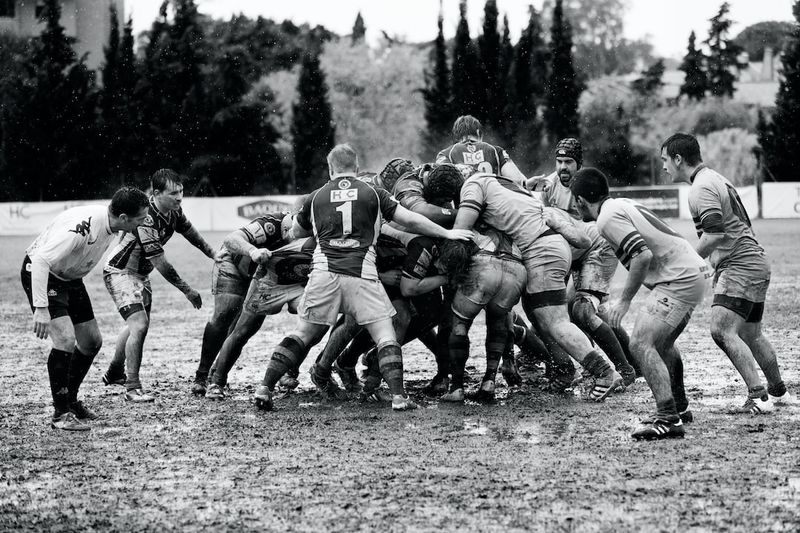Rugby World Cup 1995: Mandela, Lomu, and a Historic Final
On June 24, 1995, a historic Rugby World Cup final took place at Ellis Park in Johannesburg. The match between New Zealand and South Africa went beyond sport; it symbolized a fresh beginning for the newly democratic South Africa under the leadership of President Nelson Mandela. The final not only showcased the talents of legendary players like Jonah Lomu and Francois Pienaar but also represented the end of apartheid in a country where rugby had served as a symbol of division.
A Fresh Beginning: Sport and Apartheid
Sport has always played a significant role in society, reflecting and sometimes reinforcing cultural, social, and political ideologies. In the case of apartheid-era South Africa, rugby was intimately intertwined with the racist policies and beliefs that characterized the country at the time. The Springboks, the South African national rugby team, were largely seen as a symbol of white supremacy and racial oppression.
However, the 1995 Rugby World Cup, hosted by South Africa just one year after the fall of apartheid, became an opportunity for reconciliation and unity. The presence of President Mandela on the field wearing the Springbok jersey, traditionally associated with white Afrikaners, sent a powerful message of inclusivity and forgiveness. Mandela, a man who had spent 27 years in prison fighting against apartheid, understood the transformative power of sports and used the occasion to foster national healing and unity.
Mandela‘s interaction with Jonah Lomu, the formidable New Zealand winger, further emphasized the significance of the moment. Mandela recognized Lomu‘s exceptional talent and told him, “You are the one!” This gesture not only acknowledged Lomu‘s skill but also highlighted the ability of sports to transcend barriers and unite people.
The Game and its Significance
The 1995 final was a closely contested match that captivated the world. Despite being tryless, the game maintained a gripping intensity that held spectators in its thrall. Both teams fought relentlessly, their players colliding in bone-jarring tackles and orchestrating strategic plays.
The tension reached its peak during extra time when Joel Stransky, a Springbok player, successfully kicked a drop goal, securing victory for South Africa. The final score was 15-12, prompting jubilant celebrations and profound emotions from both players and supporters.
More than just a rugby match, the 1995 World Cup final symbolized the triumph of hope, unity, and reconciliation over a dark period in South Africa’s history. It showcased the immense power of sport to heal wounds, bridge divides, and create a renewed sense of identity and purpose.
The Legacy Lives On
Now, 28 years later, South Africa and New Zealand find themselves reunited in another Rugby World Cup final. The world may have changed significantly, but the spirit of that historic encounter remains. Both teams bring their storied rugby traditions to the field, along with the memories and legacies of the players who participated in the 1995 final. Mandela, Lomu, and their fellow teammates may no longer be with us, but their impact on the sport and the world endures.
South Africa, as the reigning world champions, fields an inspirational black captain in Siya Kolisi, symbolizing the progress made in the country since the end of apartheid. New Zealand, with their storied history and aura, continue to showcase the values of excellence, tradition, and innovation. Their meeting in Paris not only rekindles a fierce rivalry but serves as a reminder of the continued power and significance of rugby as a unifying force.
The Big Wheel Keeps on Turning
The Rugby World Cup is more than just a tournament; it is an expression of shared values, camaraderie, and the indomitable human spirit. The upcoming final between South Africa and New Zealand is both a culmination of their respective rugby journeys and a testament to the power of sport to transcend boundaries and bring people together.
As the big wheel of time keeps turning, new heroes will emerge, and new stories will be written. The legacy of Mandela, Lomu, and all those who have contributed to the growth and development of rugby will continue to inspire generations to come.
Regardless of the final outcome, the 2023 Rugby World Cup will undoubtedly leave an indelible mark on the sport and remind us of the transformative power of unity and the triumph of the human spirit.
References:
- McRae, D. (2023, October 27). Rugby World Cup 2023, Mandela, Lomu and a Rugby World Cup final that went beyond sport. Retrieved from https://www.theguardian.com/sport/blog/2023/oct/27/rugby-world-cup-2023-south-africa-new-zealand-final

<< photo by Quino Al >>
The image is for illustrative purposes only and does not depict the actual situation.
You might want to read !
- “Sounds of Freedom: Celebrating the Musical Legacy of South African Jazz Maestro with Google Doodle”
- Incredible Journey: Prichard Colon’s Inspiring Progress in 2023
- Remembering the Legacy: A Farewell to BBC Newsreader George Alagiah
- Exploring the Clash: All Blacks vs Argentina – Rugby World Cup 2023 Match Analysis
- “Rugby Rivalry Reignites: Argentina Takes on New Zealand in Thrilling World Cup Clash”
- Exploring the Opening Weekend Highlights of RWC 2023: A Riveting Recap in Less than 4 Minutes
- “Boris Johnson Takes Center Stage: The Unconventional Journey from Prime Minister to GB News Host”
- “The Redemption of James Blunt: Exploring the Perils of Public Perception”
- Boris Johnson’s New Role: From Prime Minister to GB News Host




